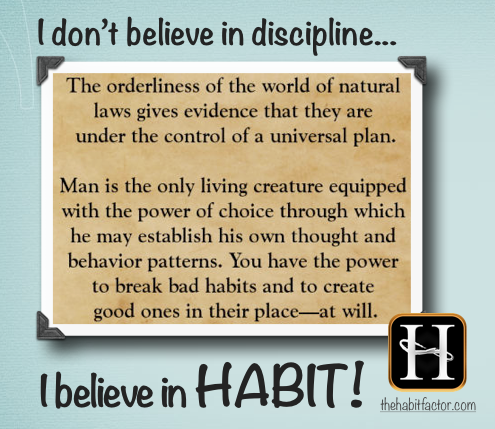
By: Martin Grunburg
This is a brief excerpt of Napoleon Hill’s (highly recommended) The Science of Personal Achievement from Nightingale-Conant.
[hana-flv-player video=”https://thehabitfactor.com/wp-content/uploads/2013/06/Nap-hill-cosmic-habit-force1.m4a” width=”400″ height=”30″ description=”” player=”5″ autoload=”true” autoplay=”false” loop=”false” autorewind=”true” /]
As you may recall, this, THE LAW OF COSMIC HABIT FORCE is Hill’s great discovery he described it. What makes it so remarkable is he “discovered” this, 20 years AFTER he wrote and published Think & Grow Rich. He was truly dumbfounded by the number of people who did not “grow rich” and did not become “successful” after reading and applying his 16 principles outlined in his best-selling book. For a refresher on this topic see this post.
Why is this important?
Well, just as The Law of Comic Habit Force (as he points out) keeps the planets in orbit, it has the ability to carry your behaviors (supportive and non-supportive) on indefinitely. However, unlike your dog or cat (or any other animal with ingrained habits/instincts), YOU have the ability to intentionally select and craft habit patters that support your goals and ideals. Re-read that last sentence please.
The key word is effortlessly. Your behaviors become EASIER not harder, over time because of HABIT. This example is a bit overused at this point because it’s a good one: How hard was it to learn to tie your shoes? Now, how easy is it? Does it require any conscious thought? Does it require much energy, effort, brain power? The efficiency of HABIT is can not be over-emphasized!
And, the beauty is, knowing you can intentionally and deliberately craft supportive habits you need NOT worry about willpower or discipline since they too are habits.
Earlier this year I posted the “Discipline Dilemma” and just a few weeks ago I put this image (above) on the THF facebook fan page (I hope you join me here / there ; ).
As you can see, I continue to emphasize that the big “D” DISCIPLINE and even “Willpower” are totally and completely over-rated. In fact, if you are trying to achieve ANY goal perhaps the best thing you can do is forget about either and simply focus on developing core, supportive HABITS!
As a coach the one thing I hear all too often is, “I’m not disciplined enough, I know what i need to do but don’t seem to do it.” (Sound familiar?) I also reference this in the book.
The challenge with that statement is that the person is focusing on discipline which is a result instead of the process. And, it’s the process of baby-steps and creating habits that actually helps you achieve such an end result. It is habit that carries you there. Nobody is born with willpower or discipline— each are forged / learned behaviors refined and reinforced over many years (often through our upbringing / our environment) until one day, somebody turns to you and says, wow, I wish I were as discipline as you.”
HOW DO I DO THAT?
By following The Habit Factor’s methodology to form good habits. First, you establish Target Minimums (Minimum Success Criteria), Target Days and a Tracking Period. Only The Habit Factor® allows users the ability to establish this core criteria and most importantly measure it against their ideal / target behaviors—(did I say only The Habit Factor®?) And, only The Habit Factor® offers, the user the ability to compare Actuals vs Targets over the Course of the Tracking Period. For more on this check out this post.
You see, HABIT consists of different strength levels. In fact, one of the earliest researches Clark C. Hull referenced something called, Drive Theory and in my opinion more importantly habit strength which is a product of past conditioning.
To underscore the importance of HabitStrength™ vs Willpower. Let me share with you that I had no willpower or discipline to write a book yet, I have written a book. And, I certainly didn’t have the willpower or discipline to complete an Ironman triathlon yet I’ve now completed several. My friend didn’t have the willpower to lose 30 pounds and guess what, he didn’t need it. He simply tracked the core, related behaviors and developed HabitStrength™ by following The Habit Factor’s P.A.R.R. methodology for habit development.
Please though, don’t take it from me, thankfully, a study was recently released by a couple great behavioral researchers from USC restating what The Habit Factor has been teaching for years.
“The whole focus on controlling your behavior may not actually be the best way to get people to meet goals,” she said. “If you are somebody who doesn’t have a lot of willpower, our study showed that habits are even more important.” … Wood said. “Habits don’t require much willpower and thought and deliberation.”
And, worth noting this study came out years after The Habit Factor®
So there you have it. Take it from me or take it from the Ph.D’s but just take it. Use it. Apply it.
The next post will dive into the path to HabitStrength™ and how applying The Habit Factor’s own, P.A.R.R. methodology specifically strengthens your intentionally crafted, favorable habits that lead you to achieving your goals!
Until then, do me and you a favor FORGET ABOUT WILLPOWER. FORGET ABOUT DISCIPLINE. (please) ; )
~mg